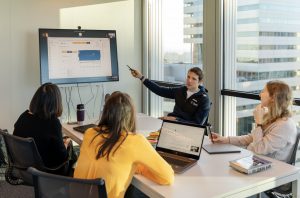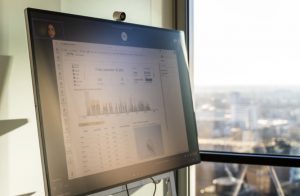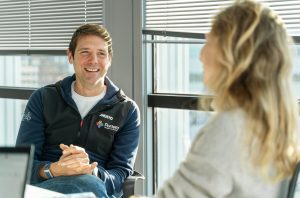Partnership with Sailing Innovation Centre
“When I was an elite sailor I spent many hours on the water, practicing and improving my skills. But when I was off the water, there is little that I could do apart from improve my mental and fitness level. That is what I am changing with Portera. I see data as the next big opportunity in sailing, and together we are working to transform the access and use of data to drive sailing team performance.”
Annemiek Bekkering, Sailing Innovation Centre, The Hague.

Sailing: The latest sport to embrace data to drive elite performance
Stories of sporting success powered through data analytics are now commonplace. In Europe it was probably Sir Dave Brailsford’s domination of cycling with Team Sky that was the proverbial damn-bursting moment for sport’s use of data to drive elite performance success. Now football, tennis, motorsport, and most recently golf (with Europe’s Ryder Cup triumph in 2023 largely credited to Edoardo Molinari’s obsession with stats) have statistics in general, and AI probability modelling more specifically, at the core of all training, match-planning, and in-match management and evaluation.
Now it is the turn of sailing. And leading the way are the Sailing Innovation Centre, The Hague, and business and technology consultancy, Portera B.V.

The starting point: Passion, and frustration, to achieve elite sporting success
Annemiek Bekkering is a talented, highly successful, elite sailor. Now retired from competitive sailing, Annemiek competed at the 2016 Summer Olympics in Rio de Janeiro and again in Tokyo 2020, where she achieved the amazing feat of winning Bronze for the Dutch sailing team in the women’s 49er FX. Surrounding this high point was a career spanning two decades where she competed in multiple elite sailing events, rapidly establishing herself as a leading light in the Dutch sailing scene. Yet in spite of complete dedication to sailing, and maximising her training opportunities and potential, there was a gap – a hole that if filled, she knew would further enhance her performance, and unlock greater success for her and her team.
“When I was an elite sailor I spent many hours on the water, practicing and improving my skills. But when I was off the water, there is little that I could do apart from improve my mental and fitness level. If I’m not on the water, how can I learn, practice manoeuvres, and experiment different approaches and strategies to see what would deliver the best racing outcome? And when racing, I am focussed on my boat and all the variables around me – it’s hard to study what all of my competitors are doing. All I could do was think about me, working on my physical performance and readiness, and wait for the next training session or event”. [Annemiek]
In 2021 Annemiek left competitive sport and moved into a new role at the Sailing Innovation Centre, The Hague (SIC). The mission of SIC is clear; to accelerate innovations in sailing. The centre supports the sporting ambitions of the Netherlands in sailing, promotes interest in sailing and contributes to economic growth by supporting companies in realizing new and better products and services. In short: more medals, more people to experience the sport of sailing, and more business.
It is in this role that she decided to combine her passion for sailing, with the frustration she had as an elite sailor. And in turn Annemiek is changing the course of her team, and the sport, for the future.
“I think sailing as a sport should be addicted closely connected to data. And we see this happening in yacht racing, ocean racing and so on. However, in the Olympic sailing arena, this is not a common thing. And that is what I am changing. I see data as the next big opportunity in sailing, and together with Portera we are working to transform the access and use of data to drive sailing team performance. Rather than all experimentation and learning being done on the water, we are combining data analytics, AI, and advanced modelling to use data to enable athletes to understand race performance, the environmental dynamics, and explore race strategies before, and after races. Our belief is that with better data the athletes will have better decision-making in race moments”.
Stage 1 of the journey: Creating the North star

In 2023, Portera B.V., a global business and technology consultancy headquartered in Amsterdam, NL, joined Team Allianz in sponsoring a number of Dutch sailing athletes in their pursuit of Olympic success in Paris, 2024. Through this partnership Baris Kavakli, CEO of Portera and a keen sailor himself, and Annemiek made an instant connection. This connection was around a shared ‘north star’ of supporting businesses and athletes to achieve success through smart use of data. They both saw this ‘off water’ performance gap, and formed a joint passion to fill it.
What if the athletes had complete data on race situations – water speed and direction, wind speed and direction, boat speed and direction, all connected to race performance in an accessible intuitive interface? What if teams could analyse their race strategy against their competitors? And what if that went further, to allow for modelling, outcome probability modelling, and enablement of simulating various race situations and strategies to understand likely outcomes?
That would allow athletes to plan, experiment, and explore outcomes like pilots do in simulators, like Formula 1 cars do in race strategy simulations, and like Ryder Cup golfers did to great success in 2023.
What if the Sailing Innovation Centre, The Hague, partnered with the cutting-edge AI and data team at Portera to realise this potential and change the course of sailing in the Netherlands forever?
“Why not? It’s a no-brainer for us. At Portera we help our clients succeed in achieving the business outcomes they want by using data, AI, and technology. That’s what we do. And we can apply this expertise to sailing, to help sailors and the SIC achieve higher performance through the smart aggregation, manipulation, modelling, and visualisation of data. I am so excited for what we are starting to achieve together” Baris Kavakli, CEO, Portera.
Stage 2: Rapid MVP to prove the idea

In October 2023, Project Neptune was formed. Spanning members of Portera’s AI and data team, project leads at the SIC, and with the support and active involvement of Team Portera sailors, a working group set out to rapidly prove the value of data in driving superior performance in sailing.
Neptune has a clear goal: leverage data to drive greater understanding of race situations, leading to the ability to simulate and predict race outcomes using alternative strategies.
And the first step on the journey? Gathering the available data and creating a base-line reporting suite.
“We wanted to move at speed to understand firstly what we already have. What data can we access? With what granularity? What can it tell us, and where are the gaps?” [Baris]
Within 3 weeks came the first interactive dashboard. The data team at Portera, acting with agility and precision, created an MVP dashboard to show race data in a way the sailing team and SIC community had never seen before.
When interviewed following a race, Odile van Aanholt, qualifier for Paris, 2024 and winner of the Conny Rietschoten Trophy said; “It is quite amazing what they have done in such a short space of time. We have Start Analysis, Speed Analysis, and holistic race overviews with recap, advance and rewind capability”.
“We aimed for what we thought was a stretching target with Portera, but in reality, we smashed through it before the end of the first month of the project. We can see descriptive statistics from a given race, upwind speed and distance and downwind speed and distance per team, and overall average speed and distance per team. We can study manoeuvres, evaluate race strategy, look at number of tacks and jibes, lay line analysis, bias used, speed at start, distance to start line, speed at start, position at start line. It’s incredible what we can already analyse”. [Annemiek]
In one short step, a huge leap forward has been made, giving the team a taste for what is possible.
“It is great to see the energy that the athletes, and the Neptune team have more broadly, for the first step we have taken together. We see if often in our work with companies, where they simply don’t know what they know. Data is siloed, in inaccessible formats, and either the culture, governance, or processes aren’t in place to connect these data around a business challenge. In this case it was clear… what data do we have to help the boat go faster? And so far, we have a lot!” Selvihan Yavuzer, Solution Architect and Neptune team lead at Portera.
Stage 3: Building momentum for Paris 2024

For Project Neptune, this is just the start of the journey together. Meeting in Amsterdam in January 2024, the team has set about defining an aggressive roadmap forward. With events coming in March and April, before Paris 2024 this summer, there is a lot of work to do.
“We plan to do work on inputs, and outputs. We’ve had amazing feedback from the sailors on the metrics they would like to see and analyse and also the experience on the dashboard, but there are things we can do to improve it. Working with Annemiek and the SIC, we know there is more data that we can gather, like using IoT in real time to improve our data set and model. And we are hugely excited with the ideas we have for race simulation and outcome prediction. This will allow us also to track and analyse training camps and how much improvement the top sailors have achieved”. Yasemin Orhun, Project Neptune lead developer.
What’s next?

Over the coming months the team will add layers of additional analysis and reporting, tracking both race data and regatta progression. This layering up of race data, as well as competitor modelling, will mean that sailors can not only study their performance, but also gain insight into the direct and indirect competitors’ race strategies.
We also plan to bring in Training Reports, connecting training data with event and regatta data. By boosting the visibility of performance across all their activities, and connecting it with additional third-party data sources, we aim to bring a complete feedback-loop to data driven performance.
“I say to my clients, ‘no wind is favourable for a captain that doesn’t know where they are going’. The complete opposite is true here. With Project Neptune, for our elite sailors, Sailing Innovation Centre and the Portera team, we have complete clarity on our mission, and huge belief that we are on the right path. And I am excited to see what the top sailors of the Netherlands can achieve in Paris 2024 and beyond” Baris Kavakli

